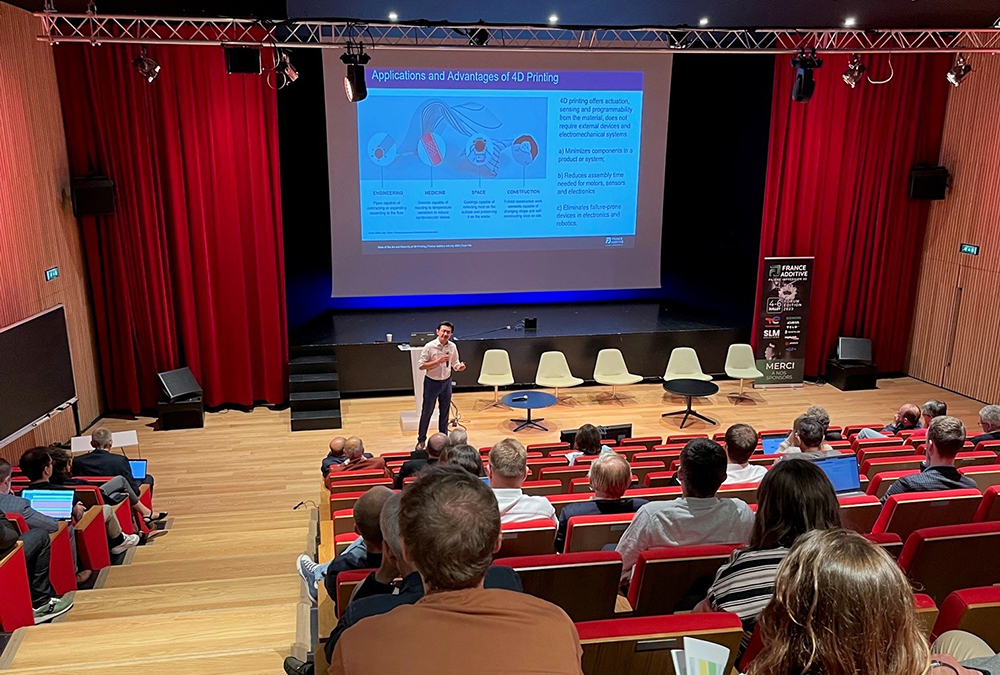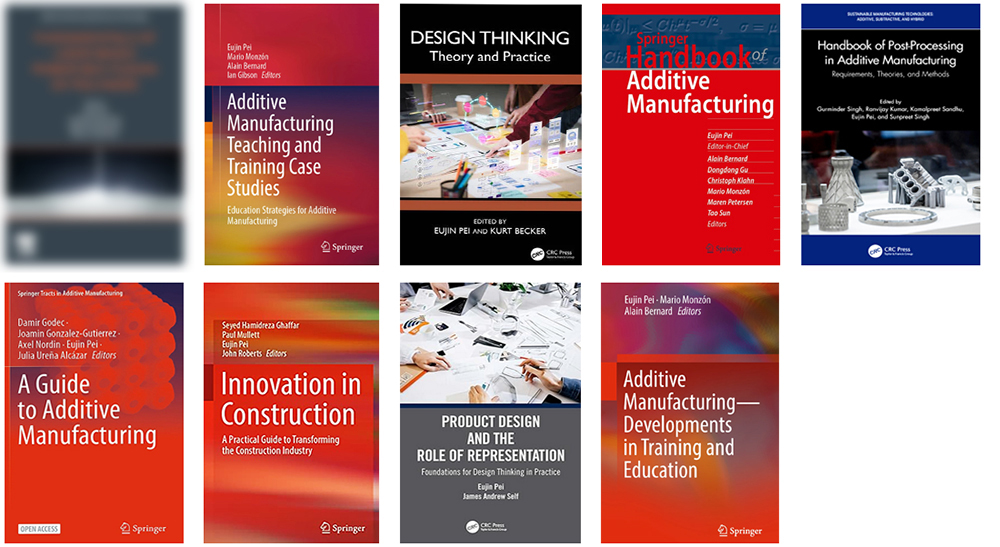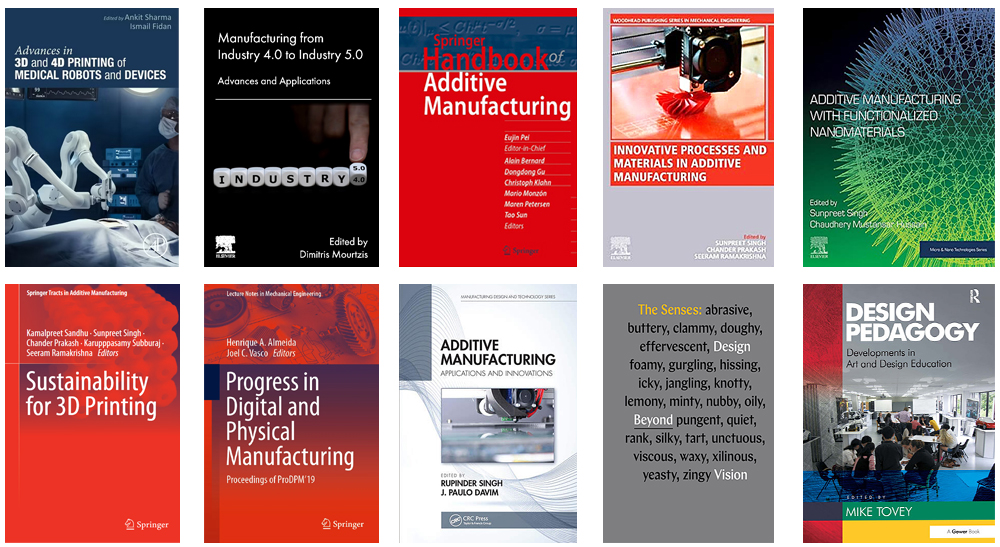

|
Professional Profile // Leadership // Publications // Training // Outputs // CoLab Site // Send an Email // ................................................................................................................................ |

Impact of 4D Printing Research on Industry and National Policy Eujin is a pioneer in 4D Printing with Shape Memory Polymers, significantly advancing the understanding of how Additive Manufacturing processes influence the shape-changing behavior of 4D Printed components. He developed one of the earliest comprehensive frameworks for 4D Printing, supported by foundational research on shape-change taxonomy, thermo-mechanical actuation mechanisms, the impact of infill patterns and densities on performance, and lightweight parametric design optimization. Collaborating directly with BAE Systems and the Defence Science and Technology Laboratory (DSTL), Eujin produced some of the UK’s first 4D printed demonstrators, which led to subsequent projects on passive locking systems and drone applications. His research informed key UK government initiatives, including the Office for Science Foresight Project on Technology Needs and the Rapid Technology Assessment on 4D Printing, with findings presented to Sir Patrick Vallance, the then Government Chief Scientific Adviser. By bridging academic research with strategic policy, Eujin has shaped UK industrial innovation, influenced national science and technology policy and contributed to strengthening UK industrial competitiveness in advanced manufacturing. He has been invited to deliver keynote presentations at leading conferences such as RAPDASA (2023), Forum France Additive (2023), and Progress in Digital and Physical Manufacturing (2021). He has a Google Scholar h-index of 31 and Scopus h-index of 26 (2025). A full list of journal publications is available upon request. Below is a selection of his edited books and book chapter contributions. ........................................................................................................................................... Selection of Edited Books (2025)  1. Pei, E., Seepersad, C., Kleszczynski, S. & Lakomiec, M. (eds.) (2026) Fundamentals of Laser-Based Powder Bed Fusion of Polymers. 1st edn. Elsevier, Cham. ISBN 9780443299988. This book provides a detailed exploration of laser-based powder bed fusion (LBPBF) for polymers, addressing material properties, process monitoring, design principles, and post-processing. It examines powder characteristics, microstructure, mechanical performance, and nondestructive testing, complemented by industrial case studies. The book systematically covers process fundamentals, design considerations, raw material selection and management, production workflows, and quality assurance including certification and qualification standards. 2. Pei, E., Monzón, M., Bernard, A. & Gibson, I. (eds.) (2025) Additive Manufacturing Teaching and Training Case Studies: Education Strategies for Additive Manufacturing. Cham: Springer Nature Switzerland AG. This volume offers comprehensive insights into the pedagogy and practice of additive manufacturing education. Contributions from global experts focus on integrating AM into curricula, specialized applications including special needs education, and balancing creativity with functional design. Case studies illustrate approaches to workforce development, collaborative training, and distance learning. Innovative teaching methods such as virtual reality immersion and metacognitive strategies are discussed alongside sustainability and medical applications. 3. Pei, E. & Becker, K. (eds.) (2025) Design Thinking: Theory and Practice. Abingdon: Routledge. ISBN 9781032767802. This book explores design thinking through cognitive, strategic, and practical frameworks applied across diverse disciplines. It investigates problem-solving, systems thinking, and innovation within product and service design. By combining academic and practitioner perspectives, the text provides multidimensional insights into the reasoning processes involved in design, making it a valuable resource for engineers and designers seeking to apply design thinking in professional and everyday contexts. 4. Pei, E., Klahn, C., Gu, D., Monzon, M., Sun, T., Bernard, A. & Petersen, M. (2023) Springer Handbook of Additive Manufacturing. Cham: Springer Nature AG. doi:10.1007/978-3-031-20752-5. This major handbook serves as a comprehensive reference covering fundamental concepts and advanced applications of additive manufacturing. Organized into seven sections, it includes foundational principles, design and data management, process technologies, materials, post-processing, education, and application case studies. The work aims to inform students, researchers, and industry professionals, facilitating informed decision-making and implementation of AM technologies. 5. Singh, G., Kumar, R., Sandhu, K., Pei, E. & Singh, S. (2023) Handbook of Post-Processing in Additive Manufacturing: Requirements, Theories, and Methods. Boca Raton, FL: CRC Press. doi:10.1201/9781003276111. This handbook compiles recent advancements in post-processing methods for additive manufacturing components. It emphasizes techniques that address common deficiencies in AM parts and provides foundational theory, experimental data, and case studies. The coverage spans various post-processing technologies, material classes, and engineering applications, offering a resource for researchers and practitioners focused on enhancing AM part performance. 6. Godec, D., Gonzalez-Gutierrez, J., Nordin, A., Pei, E. & Ureña, A.J. (2022) A Guide to Additive Manufacturing. Cham: Springer Nature AG. doi:10.1007/978-3-031-05863-9. This open access volume presents both theoretical and practical perspectives on additive manufacturing technologies. It introduces AM processes, workflows, and standards, followed by detailed discussions on design optimization, simulation, and economic considerations. The book also covers material development and processing parameters, with a focus on polymer and metal technologies, concluding with functionally graded manufacturing. Industrial applications are integrated throughout to demonstrate practical benefits. 7. Ghaffar, S.H., Mullett, P., Pei, E. & Roberts, J. (2022) Innovation in Construction: A Practical Guide to Transforming the Construction Industry. Cham: Springer Nature AG. doi:10.1007/978-3-030-95798-8. This book addresses the implementation of innovation and advanced technologies in construction. It offers practical guidance on methods for effective technology adoption, necessary skill development, and structural adjustments required for industry transformation. The text targets professionals seeking to facilitate innovation within construction environments. 8. Pei, E. & Self, J. (2022) Product Design and the Role of Representation: Foundations for Design Thinking in Practice. Abingdon: Taylor & Francis. doi:10.1201/9781003227694-2. This volume examines the role of design representations as theoretical constructs within the design process. It explores how fidelity and ambiguity influence creativity and decision-making, framing design thinking through representation analysis. The text provides insights valuable to design engineers and researchers interested in the cognitive aspects of design. 9. Pei, E., Monzon, M.D. & Bernard, A. (eds.) (2019) Additive Manufacturing – Developments in Training and Education: Best Practices, Challenges and Opportunities. Cham: Springer Nature. doi:10.1007/978-3-319-76084-1. This collection highlights emerging methods in additive manufacturing education and training. It discusses new teaching approaches, certification requirements, and the use of maker spaces to increase societal awareness of AM. Contributions from international experts provide a comprehensive overview of educational developments aimed at expanding professional pathways and community engagement in additive manufacturing. ........................................................................................................................................... Selection of Book Chapters (2025)  1. Pei, E., Mansaray, J. & Loh, G.H. (2025) 4D printing: An overview of medical and biomedical applications. In Sharma, A. & Ismail, F. (eds.) Advances in 3D and 4D Printing of Medical Robots and Devices. Oxford: Elsevier. ISBN 9780443248610. 2. Mourtzis, D., Stavropoulos, P. & Pei, E. (2024) From data collection to advanced analytics and wisdom creation in manufacturing processes. In Mourtzis, D. (ed.) Manufacturing from Industry 4.0 to Industry 5.0. Oxford: Elsevier. doi:10.1016/B978-0-443-13924-6.00018-1. 3. Pei, E., Kabir, I.R. & Leutenecker-Twelsiek, B. (2023) History of AM. In Pei, E., Bernard, A., Gu, D., Klahn, C., Monzon, M., Petersen, M. & Sun, T. (eds.) Springer Handbook of Additive Manufacturing, Part F1592, pp. 3–29. Cham: Springer. doi:10.1007/978-3-031-20752-5_1. 4. Hardacre, D.G. & Pei, E. (2023) Standards for Additive Manufacturing. In Pei, E., Bernard, A., Gu, D., Klahn, C., Monzon, M., Petersen, M. & Sun, T. (eds.) Springer Handbook of Additive Manufacturing, Part F1592, pp. 145–161. Cham: Springer. doi:10.1007/978-3-031-20752-5_10. 5. Klahn, C., Butler, D. & Pei, E. (2023) Economics of Additive Manufacturing. In Pei, E., Bernard, A., Gu, D., Klahn, C., Monzon, M., Petersen, M. & Sun, T. (eds.) Springer Handbook of Additive Manufacturing, Part F1592, pp. 31–42. Cham: Springer. doi:10.1007/978-3-031-20752-5_2. 6. Azhar, F.E. & Pei, E. (2023) Improving the communication of 4D printing between engineers and designers. In Singh, S., Prakash, C. & Ramakrishna, S. (eds.) Innovative Processes and Materials in Additive Manufacturing. Cambridge: Woodhead Publishing. doi:10.1016/B978-0-323-86011-6.00006-4. 7. Kabir, I. & Pei, E. (2021) Functionally graded additive manufacturing. In Singh, S. & Hussain, C. (eds.) Additive Manufacturing with Functionalized Nanomaterials. Amsterdam: Elsevier. doi:10.1016/B978-0-12-823152-4.00006-5. 8. Almeida, H., Pei, E. & Vitorino, L. (2020) Sustainability for 3D printing. In Sandhu, K. et al. (eds.) SUS3DP2020. Cham: Springer. doi:10.1007/978-3-030-75235-4_1. 9. Pei, E., Loh, G.H., Nam, S.W. & Azhar, E.F. (2020) Programming 4D printed parts through shape-memory polymers and computer-aided design. In Almeida, H. & Vasco, J. (eds.) Progress in Digital and Physical Manufacturing: ProDPM 2019. Lecture Notes in Mechanical Engineering. Cham: Springer. doi:10.1007/978-3-030-29041-2_19. 10. Pei, E. & Loh, G.H. (2018) Future challenges in functionally graded additive manufacturing. In Pei, E., Monzon, M.D. & Bernard, A. (eds.) Additive Manufacturing – Developments in Training and Education, pp. 219–228. Cham: Springer. doi:10.1007/978-3-319-76084-1_15. 11. Bernard, A., Thompson, M.K., Moroni, G., Vaneker, T., Pei, E. & Barlier, C. (2018) Functional, technical and economical requirements integration for additive manufacturing design education. In Pei, E., Monzon, M.D. & Bernard, A. (eds.) Additive Manufacturing – Developments in Training and Education, pp. 171–185. Cham: Springer. doi:10.1007/978-3-319-76084-1_12. 12. Assunçao, E.G., Silva, E.R. & Pei, E. (2018) Professional training of AM at the European level. In Pei, E., Monzon, M.D. & Bernard, A. (eds.) Additive Manufacturing – Developments in Training and Education, pp. 211–217. Cham: Springer. doi:10.1007/978-3-319-76084-1_14. 13. Maidin, S., Pei, E. & Muhamad, M.K. (2018) A novel approach of using ultrasound to improve the surface quality of 3D printed parts. In Singh, R. (ed.) Additive Manufacturing: Applications and Innovations. Boca Raton, FL: CRC Press/Taylor & Francis. doi:10.1201/b22179-7. 14. Lupton, E. & Lipps, A. (2018) The Senses: Design Beyond Vision. New York: Cooper-Hewitt Smithsonian Design Museum/Princeton Architectural Press. ISBN 9781616897109. 15. Evans, M.A., Campbell, M.A. & Pei, E. (2015) Developing tools to support collaboration and understanding during industrial design practice. In Evans, M.A. & Campbell, M.A. (eds.) Design Pedagogy – Developments in Art and Design Education. Farnham: Gower. ........................................................................................................................................... |